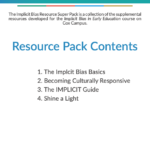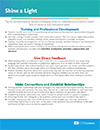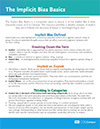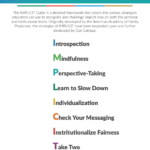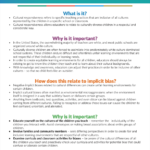Implicit Bias in Education, Birth through 3rd Grade
We all have biases, it’s part of being human – but did you know that some of our biases fly under the radar and go unnoticed? These are called implicit biases, and even though we are often unaware of them, they still have the power to influence how we think, behave, and interact with others. In an early education setting, implicit biases can influence educators to behave in ways that result in unfair learning environments, reduced child outcomes, and the mistreatment of certain children. Throughout the lessons of this course, educators will learn more about what implicit bias is, how it affects the children they teach, and what steps they can take right away to better understand and limit the influences of their own implicit biases.
- Cost
- 100% Free
- Time to complete
- 2 Hours
- All educators
- Educators will understand what implicit bias is and how it differs from explicit bias.
- Educators will learn where implicit biases come from and how they develop.
- Educators will understand how implicit bias can potentially create unfair learning environments and lead to the mistreatment of children.
- As a result of becoming more knowledgeable, educators will also become more self-aware and capable of recognizing the influence of implicit bias.
- Educators will learn strategies for how to limit the influence and impact of implicit bias in their schools and classrooms.
The information in this course will help child-facing professionals address the negative impacts of bias in the classroom.
Implicit Bias Review Panel – these field experts contributed to the development of this course:
- Walter Gilliam, PhD – Yale University, SME
- Iheoma Iruka, PhD – University of North Carolina, SME
- Rosemarie Allen, PhD – Metropolitan State University of Denver, Review Panel
- Kent McIntosh, PhD – University of Oregon, Review Panel
- Shantel E. Meek, PhD – Arizona State University, Review Panel
- Andrew Meltzoff, PhD – University of Washington, Review Panel
- Eva Marie Shivers, PhD – Indigo Cultural Center, Review Panel
- Howard Stevenson, PhD – University of Pennsylvania, Review Panel
- Dawn A. Yazzie, PhD – Southwest Human Development, Review Panel
How it Works
-
Learn at Your Own Pace
You don’t have to finish the course all in one sitting. In fact, we recommend you take this course a little bit at a time, incorporating what you’ve learned in the classroom.
-
Earn IACET CEUs
In order to pass and receive IACET CEUs for this course, you will first need to complete all the lessons, then complete the end of course assessment with a score of 80% or higher.
-
Free Guided Resources
As you go through a course, we’ll introduce you to free resources that will help you implement what you’re learning.
-
Never Learn Alone
Have a question on what you’re learning in the course or how to use a resource? Reach out to the Cox Campus community for advice or to lend a helping hand to others.
Lessons
-
Lesson 1

An Introduction to Implicit Bias
Duration 45 minutesA detailed look at what implicit bias is, where it comes from, and how it can be triggered to influence a person’s thoughts and behavior -
Lesson 2

The Impact on Children
Duration 32 minutesEducators will learn how implicit bias can lead to the mistreatment of children, resulting in unfair learning environments and diminished educational opportunities. -
Lesson 3

Making a Difference
Duration 35 minutesAn educator’s strategy guide for learning how to reduce and limit the impact of implicit bias in schools and classrooms. -
Lesson 4

Implicit Bias End of Course Assessment
Duration 20 minutesIn this lesson, you will take the end-of-course assessment and post-course survey. You must score 80% or higher to pass the assessment and receive your certificate of completion.
Your Facilitator

FAQs
The Rollins Center, of the Atlanta Speech School, in some cases, may allow an instructor, facilitator, content editor or a subject matter expert or consultant with proprietary interests to conduct professional development activities at Rollins events, provided that appropriate disclosure of such interest is made. Disclosure of proprietary interest will be made on course material and at the beginning of the course/learning event, when applicable.

